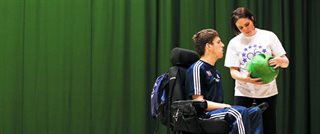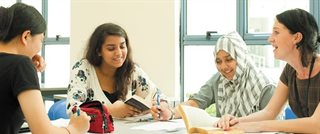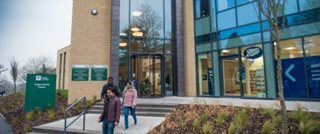Student Support
There are lots of points of contact, both academic and pastoral, to support you during your studies in the School of English. This page provides further information on the support that is available to you.
School Support
The School of English offers a number of tutoring and mentoring schemes.
Personal Tutor
All undergraduate students in the School of English are allocated a Personal Tutor. You are expected to meet with your tutor at several points each academic year. They will help you develop academic and professional skills throughout your degree, offering support for any potential personal problems. Your Personal Tutor is the first point of contact for any advice. They will work with you to review your degree progress and help you identify and achieve your personal goals.
What does personal tutoring involve?
Personal Tutors are academic members of staff who offer support and guidance in:
-
professional development - e.g. careers, volunteering, placement opportunities
-
academic development - e.g. essay writing, time management, revision
-
pastoral and welfare needs - e.g. personal problems, health issues
-
academic community
All Single Honours English undergraduate students take Academic Community, a year-long module in their first year. The module introduces topics and concepts relevant to studying English and studying at University, with team-taught lectures every fortnight and small tutorials led by your Personal Tutor in the intervening weeks. The module also helps tutees to get to know their Personal Tutors, and is assessed by a presentation and a portfolio of work.
Senior Tutor
The School’s welfare and support systems are overseen by a senior member of academic staff, the Senior Tutor. Every School and Department at the University of Nottingham has a Senior Tutor.
Peer mentor
All new undergraduate students can opt into our peer mentoring scheme, to be allocated a peer mentor. Your peer mentor will help you settle into life at Nottingham, provide advice on the transition to university-level study and help you access support if needed.
What does the scheme involve?
As part of the scheme:
- Every incoming student has the option of a designated peer mentor
- Students meet regularly in small groups with their peer mentor
- Mentors are on hand to guide students through the process of settling in, submitting work, learning how to use campus resources
- Peer mentors are an additional source of support, alongside personal tutors
- Students have the opportunity to become peer mentors themselves in their second year
Mentors are available from the end of August, so they can also help you get ready to arrive in September as well as once you are here.
Request a mentor
We try and match you to someone based on your interests as well as the course you are studying. If you have any questions, contact EnglishESE@nottingham.ac.uk.
Wider University Support
General Support and Services
Students are among the groups most likely to be affected by the cost-of-living crisis. The University has highlighted all the information, advice and support available to you. From financial support to kitchen access to laptop repairs, find out what's available to you as a student.
Student Services Centres
Student Services provide a range of support, information and specialist services to enhance your student experience. You can go to a Student Service Centre (SSC) for advice on:
- any disability, learning difficulty, or specific support needs that you might have
- financial support
- housing
- money
- education/University-related queries
How do I get in touch with an SSC?
There are a number of SSCs around the University, and you can drop into whichever of these is most convenient to you.
SSC locations
You can also call them on 0115 74 86500 or send a message via their webpage.
Student Support and Wellbeing Service
The Support and Wellbeing Service is here to help you. They can offer you advice and support for any concerns, emotional or personal difficulties or ongoing health conditions. This can be in person, online through MS Teams or over the phone. Whatever you are struggling with they are here to listen and advise, they can also refer you to support that would be best suited for your needs.
The key things the Student Support and Wellbeing Officer can advise on include:
- Any wellbeing concerns you may be having
- Any matters which may affect your studies, and which processes to follow
- How to access specialist support at the University
Academic Skills Team
Based in Hallward Library, the Academic Skills Team support students in developing the skills they need to be more confident in their studies. They work with a range of Schools and Faculties on programmes to help students in areas such as academic writing, time management, use of feedback, and working in groups.
Report and Support
The University of Nottingham is committed to ensuring we do everything we can to provide a safe and supportive environment for everyone. If you or someone you know has experienced or witnessed an incident, you can tell us anonymously or ask to speak an advisor. Speaking to an advisor does not mean that you are making a formal report to the university, it is to enable you to access the support you need to make an informed decision.
Support for Specific Needs
As well as the more generalised support services mentioned above, students can also access support for specific needs via the following services.
Disability Liason Officer

Personal Tutors can help students with disabilities access professional support via the School’s Disability Liaison Officer (DLO).
The DLO is an academic member of staff who is available for students who need teaching and assessment support for any physical or learning disability. Working alongside the School’s Director of Student Support, the DLO can advise about the university's arrangements to put in place reasonable adjustments and personalised support plans.
International Students

International students may have slightly different needs, particularly in the early months as they settle into the University and life in Nottingham. All international students will be allocated a Personal Tutor who has an understanding of the specific needs of international students and who can offer specific support and can be available for more frequent Personal Tutor meetings initially.
The University has an excellent International student support network.
Find out more about support for International Students
Counselling Service

The Counselling Service aims to support students by offering free, confidential, professional help with any personal, emotional or mental health problems they may experience whilst at the University.
Counselling provides an opportunity to talk in confidence about problems that concern you, including anxiety, depression, family issues, bereavement, study related problems, worries about drug and alcohol abuse, physical and/or sexual abuse, eating difficulties and HIV/Aids.
By talking with a counsellor about your problems or concerns, you may deepen your understanding of what is happening and develop alternative ways of dealing with the situation.
Visit the Counselling Service website
Medical and Healthcare Support

The University of Nottingham Health Service is available to all students and is located in Cripps Healthcare Centre on University Park.
University health service website
Nightline (Students' Union)

Nightline is a confidential phone line run by students for those seeking support and information. Nightline operates every night during term time between 7.00pm and 8.00am.
Contact a Nightline
Students' Union Networks

To find a student network select "University Park & Jubilee" on the Student Union's Find a Group page. Then select "Student Networks".
Find a Network
University Chaplains
Chaplains are here to support all students and staff (of any faith or none). They help people practice their faith and engage with faith communities, but also much more widely they offer general pastoral support to anyone who need someone to listen or to talk things through with.
The Chaplaincy
Students can find out about faith based societies on the Students' Union website.
Find out more